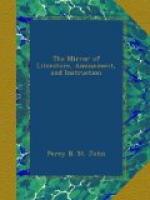People occasionally possess the power of voluntary action with the muscles of the nose, and can move it horizontally, or to the right and left,—draw it up or protrude it,—so as to make it take any position they please. Painters have been provokingly deceived by this stratagem, and have in vain attempted the portraits of such persons, who were able at every instant to produce a new physiognomy.
One of the qualifications for the Ugly Club was a nose eminently miscalculated, whether as to length or breadth,—the thickest skin had preference.
Hitherto we have only considered external appearances; we must now notice its functional and other properties.
With some persons, the nose is a sort of barometer,—a certain state of the atmosphere is invariably announced to them by an agreeable sensation of coldness at the tip.
Zimmerman used to draw conclusions, as to a man’s temperament, from his nose! Not indeed from its size or form, but from the peculiar sensibility of the organ.
Cardan considered acuteness of smell as a proof of penetrating genius, and a lively imagination.
Haller could distinguish perspiration at ten yards’ distance.
There have been instances on record of blind people who were able to discover colours by the touch; and deaf and dumb, who could feel sounds by placing their hand upon the speaker’s mouth: this, however, is not more astonishing, than that the sense of smelling should be so acute, as to enable some persons to judge by it the quality of metals. Martial mentions a person, named Mamurra, who consulted only his nose, to ascertain whether the copper that was brought him were true Corinthian. There have been Indian merchants who, if a piece of money were given them, by applying their nose to it, defined its quality to a nicety, without touchstone, balance, or aqua-fortis. Europeans, also, are to be found whose sense of smelling is equally delicate and perfect.
Marco-Marci speaks of a monk at Prague, who, when any thing was brought him, distinguished, by its smell, with as much certainty as the best nosed dog, to whom it belonged, or by whom it had been handled. It was also said of him, that he could accurately distinguish, in this manner, the virtuous from the vicious. He was much devoted to the study of natural philosophy; and, among other things, had undertaken to oblige the world with precepts on the sense of smelling, like those we have on optics and acoustics, by distributing into certain classes a great number of smells, to all of which he had given names; but an untimely death cut him off in the midst of these curious researches.
The guides who accompany travellers on the route from Smyrna or Aleppo, to Babylon, have no other signs in the midst of the deserts, to discover their distance from the place of destination, than the smell of the sand alone, by which they determine with certainty. Perhaps they judge by the odour exhaled from small plants, or roots, intermixed with the sand.




